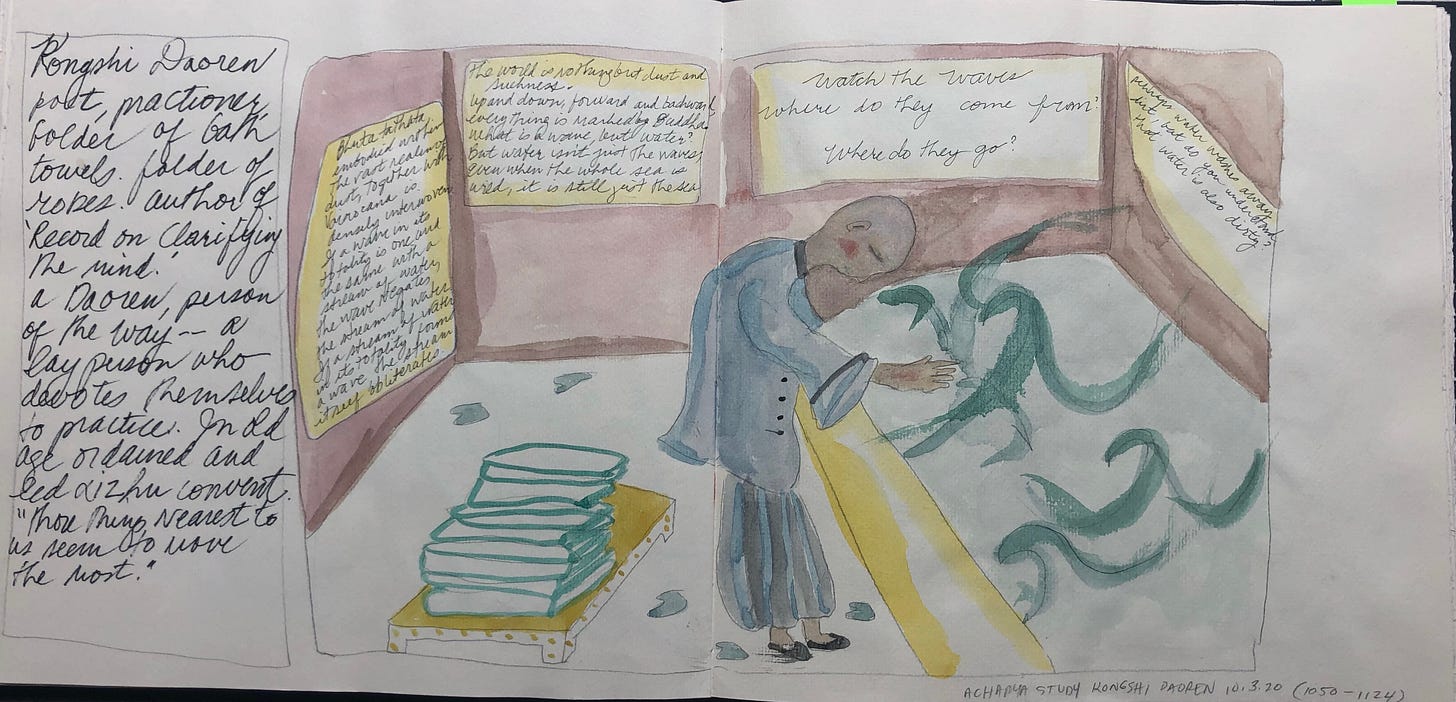
Kongshi Daoren was born in China during the 12th century. Her given name was Zhidong, and her father was a scholar. Even though she was spiritually inclined as a youth, her family would not allow her to ordain as a nun. She was the elder sister-in-law of Miaozong and was married to the grandson of a prime minister. 1
“In Kongshi’s time, women needed permission from the male head of the family to ordain. Kongshi’s father refused to allow her to become a nun; instead she entered a politically expedient marriage. In time, her husband allowed her to leave the marriage, and she had no place to go but back to her father’s house. When he died, her brother became her guardian. She asked for permission again (to ordain), and again she was refused.”2
Even without being ordained, Zhidong was permitted to study with various Buddhist teachers and was given the name “Kongshi” as a laywoman. When her brother died and she was finally able to ordain, she was given the name “Daoren,” which means “person of the Way.”3
“Even as a laywoman she was recognized and respected by well-known Zen teachers, having attained a deep enlightenment with Linji master Sixin Wuxin (1044-1115). Yuanwu, the compiler of the Blue Cliff Records, and Foyan Qingyuan (1067-1120) were her contemporaries and spoke of her with high regard.4
“Kongshi was deeply moved by a few lines from the Contemplation of the Dharmadhatu: ‘One includes all and enters all. All includes one and enters one; one includes one and enters one; all includes all and enters all. They interpenetrate one another without any obstruction.’5
Sometime later in her life, she opened a bathhouse near her teacher’s monastery. Outside the bathhouse, Kongshi Daoren inscribed this verse for bathers to contemplate:
Nothing exists, not even dirt, so what are you bathing?
Even a speck of dust—where would it come from?
Say something true and then you can enter the bath.
If the ancient spirits can only scrub your back,
how could I, the founder, bring purity to your mind?
If you want to be free from dirt,
you should first make such an effort that your whole body sweats.
It is said that water can wash off dust,
yet how can people realize that water itself is also dust?
Even though you suddenly wipe away the distinction between water and dirt,
you must still wash it all off when you come to the bathhouse.6
“In her last few phrases she worked to move people beyond a superficial understanding of washing away delusions. Using the metaphor of the bath, she referred to the dust of the world that is washed away by the water. She instructed that water can also be dust—we may even become confused and attached to the words and methods of Zen.”7
“Dirt? Water? Self? Other? Show me the difference.”—Sallie Tisdale in The Hidden Lamp
“Scrub your feet with no thought of keeping them clean.”—Rev. Shoren overheard in the Tassajara bathhouse
Marcia Lieberman’s verse: Konghsi Daoren, poet, practitioner, folder of bath towels, folder of robes, author of “Record of Clarifying the Mind.” A ‘daoren,’ person of the Way, a lay person who devotes themselves to practice. In old age ordained, and led Lizhu convent. “Those things nearest to us seem to move the most.”
Schireson, Grace. Zen Women: Beyond Tea Ladies, Iron Maidens, and Macho Masters. Somerville, MA, Wisdom Publications, 2009.
Caplow, Florence and Susan Moon. The Hidden Lamp. Boston, Wisdom Publications, 2013.
Schireson, Grace.
Ibid.
Caplow, Florence and Susan Moon.
Ibid.
Schireson, Grace.




9. “Scrub your feet with no thought of keeping them clean.” Your teaching here brought this to mind from a book of versus by Thich Nhat Hanh:
Washing the dishes
is like bathing a baby Buddha.
The profane is the sacred.
Everyday mind it Buddha mind.
Thank you for Zen in Ten /\